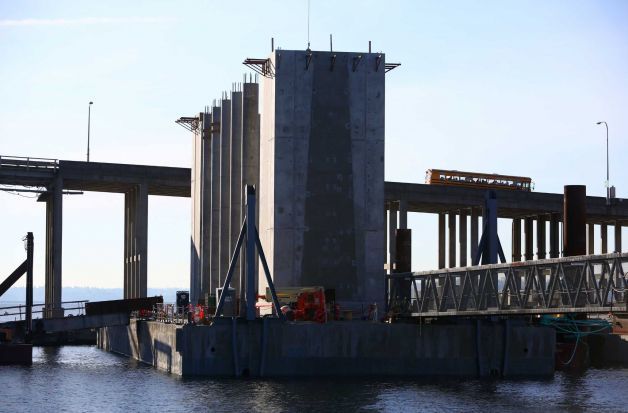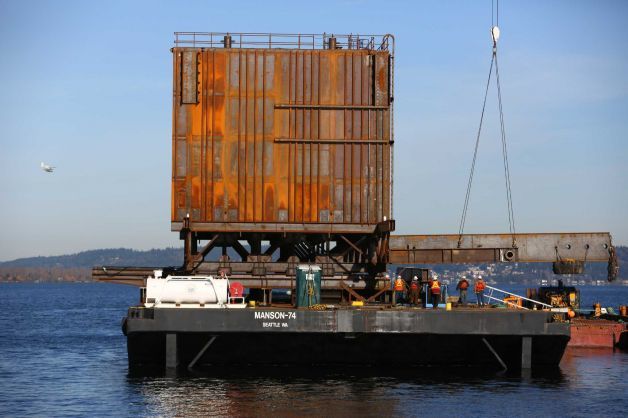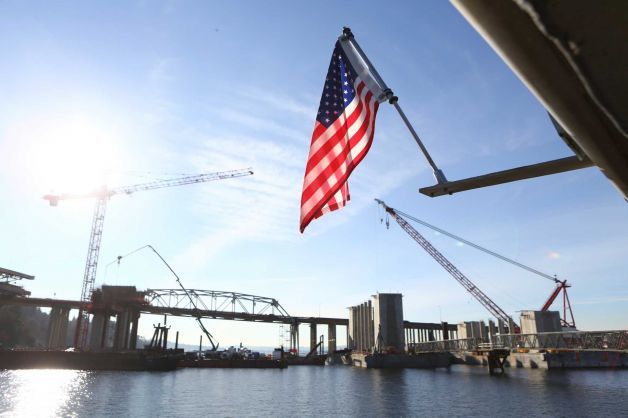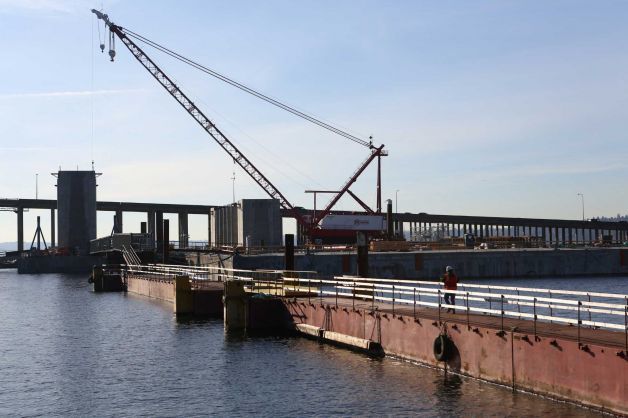Lawsuit: State shunned Chinese investors ready to fund 520 Bridge replacement for visas
An investment firm specializing in helping wealthy foreigners buy into American public projects to secure green cards has sued Washington state claiming Chinese investors were unfairly cut out of the state Route 520 bridge replacement project.
Filing the lawsuit earlier in May, attorneys for the Washington firm – Access the USA – claim the state ignored $143 million in bond offers from foreign investors. Most of those investors are wealthy Chinese nationals looking to come to the United States through an immigration program that grants legal residency to foreigners who invest at least $500,000.
At issue in the lawsuit are bonds sold to pay for the 520 bridge replacement project, a $4.3 billion effort to replace the floating bridge and improve SR 520 between Bellevue and Seattle.

A new pontoon with support columns is shown during a tour of the 520 floating bridge rebuild project on Friday, November 22, 2013
Attorneys for Access the USA claim that the state Treasurer’s Office refused to sell bonds to foreign investors while aggressively courting others, presumably Americans. The attorneys claim the state’s motive was simple – to avoid the appearance that the bridge was being built with Chinese money.
Contacted for comment, an attorney for the state declined to discuss the allegations in detail.
“We don’t believe it’s appropriate to address specific factual allegations in the complaint until we’ve had a chance to look into this further and can respond to the complaint as a whole,” Assistant Attorney General Eric Mentzer said by email Friday.

A massive 650-ton steel box called a coffer cell is shown during a tour of the 520 floating bridge rebuild project on Friday, November 22, 2013. The structure will be used to repair defective pontoons that will be used to construct the new 520 floating bridge.
Mentzer said the state has no policy against allowing foreign investors to buy into public projects.
In the days before a major bond sale, Treasurer’s Office workers lobbied the firm running the sale – Citigroup – not to allow Access the USA to buy any of the 520 debt, attorney Donald Mullins said in the lawsuit, filed in King County Superior Court.
“Employees of Citigroup indicated that the state of Washington wanted to avoid any negative association that might come from allowing a large investment in the 520 project by Chinese investors,” Mullins told the court. The state, he continued, hoped to “avoid negative media coverage surrounding Chinese investment” in the project.

The east end of the 520 floating bridge rebuild project is shown from a WSDOT boat on Friday, November 22, 2013.
Aimed at making SR 520 faster and safer, the bridge replacement project got underway in earnest in 2010 and work on the new span is currently underway.
To fund the massive project, the state has conducted a series of bond sales which will be repaid with money generated by tolls on the bridge and taxes.
Access the USA began working into invest in the project in early 2010, after identifying it as an opportunity for firm clients to obtain investors visas. The firm’s clients were allowed to take part in an October 2011 sale, buying $48 million worth of 520 bonds.
Immigration rules meant to encourage investment in the United States allow wealthy foreigners to essentially buy their way into legal residency through large investments in American companies or public projects.

Workers are shown on support columns on the new 520 floating bridge rebuild project on Friday, November 22, 2013.
Foreign investors hoping to qualify for the EB-5 visa must invest at least $500,000 in an economically depressed area of the country or $1 million in a more prosperous region. The investments must create at least 10 jobs in the United States.
In return, the investors are put on track to obtain citizenship or permanent legal status in the United States. Initially awarded the confusingly titled “conditional permanent residence” status for two years, investors are in an optimal position to petition for a green card and stay in the county indefinitely.
Having made the initial buy, Access the USA was preparing to make the largest single purchase during a second bond sale in May 2012. The firm created funds for the purchase, and was prepared to buy $143 million in state debt when the underwriters stopped working with Access the USA.
Writing the court, Mullins said the $143 million payment ready to be spent – it’d been moved to an escrow account and was ready for transfer to Citigroup. The order was placed two weeks before the sale, Mullins said, but Citigroup refused to process it because the state did not want to sell bonds to Chinese investors.
According to the lawsuit, state Treasurer’s Office staff initially denied interfering with the sale but were later found to have been soliciting investors in the weeks before the sale.

The east end of the 520 floating bridge rebuild project is shown on Friday, November 22, 2013.
“Because foreign investors were involved, the Office of the Treasurer intentionally avoided working with (Access the USA) and refused to include (the firm) in their solicitations to institutional investors,” Mullins said in court papers.
“Conspicuously absent from communications regarding institutional investors was any mention of (Access the USA’s) order, even though the size of the proposed investment would have likely made (it) the single largest in the offering,” continued Mullins, an attorney with the Shoreline firm Badgley Mullins Turner.
Attorneys for Access the USA now contend the treasurer’s office violated anti-discrimination laws as well as the securities act. They’ve asked that the state be ordered to pay for the losses sustained by the firm’s clients, as well as punitive damages for discrimination.
Also named in the lawsuit are the firms that have managed bond offerings for the project – Citigroup, J.P. Morgan Securities and Merrill Lynch. None have yet responded to the lawsuit.
Mentions
Litigation Cases
States
- Washington
Videos





Subscribe for News
Site Digest
Join Professionals on EB5Projects.com →
Securities Disclaimer
This website is for informational purposes only and does not constitute an offer or solicitation to sell shares or securities. Any such offer or solicitation will be made only by means of an investment's confidential Offering Memorandum and in accordance with the terms of all applicable securities and other laws. This website does not constitute or form part of, and should not be construed as, any offer for sale or subscription of, or any invitation to offer to buy or subscribe for, any securities, nor should it or any part of it form the basis of, or be relied on in any connection with, any contract or commitment whatsoever. EB5Projects.com LLC and its affiliates expressly disclaim any and all responsibility for any direct or consequential loss or damage of any kind whatsoever arising directly or indirectly from: (i) reliance on any information contained in the website, (ii) any error, omission or inaccuracy in any such information or (iii) any action resulting therefrom.



